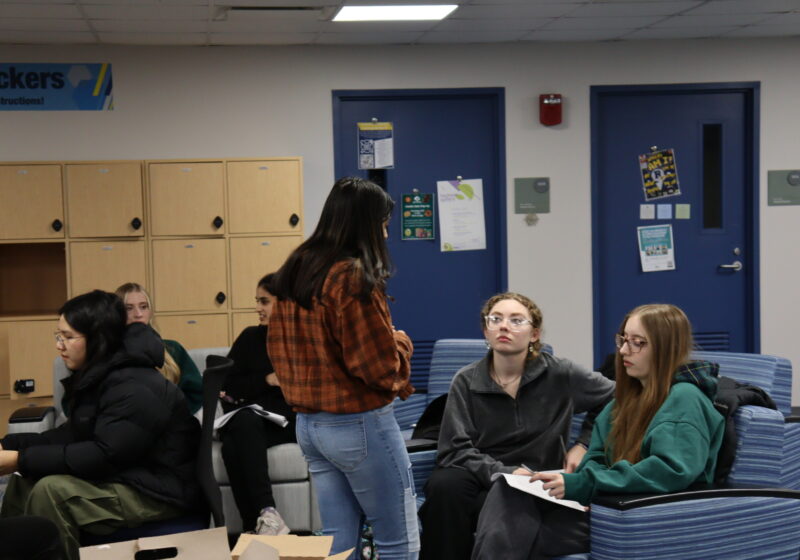In the ebbs and flows of college life, students often forget the power they hold to affect civic and community engagement. With the upcoming presidential election this November, removing the barriers for those on campus to cast their ballots is extremely important.
“We understand [the] work of community engagement and social change to be systemic in nature,” Glenn Cerosaletti, Assistant Dean and Director of UR’s Center for Community Engagement, said. “Policy change is an important aspect of that, and that requires working together with others to identify common ground, working through differences, and pursuing a common vision […] through being active and engaged and informed members of the democratic process.”
The Center for Community Engagement encompasses the University’s efforts to promote community outreach among its students, and with the Committee for Political Engagement, promoting voter participation has become second nature. Partnering with Tufts University’s National Study of Learning, Voting, and Engagement allows the University to further examine the metrics by which students register and participate in their elections.
Midterm election data shows that eligible students are registered at an average rate of just over 70%; yet of those registered to vote, approximately 36% actually did.
Although these numbers rise considerably for presidential elections — with 78% of eligible students being registered to vote on average and 54% of those voting — they signal a need for greater voter advocacy. In the last six presidential and midterm elections, students who were eligible to both register and vote at the University did so at a rate of just over 40%.
“The University of Rochester has that obligation to ensure that all students who vote are given the opportunity to do so [through] information and resources,” Cerosaletti further explained. “The value in having students involved in that work through our Committee for Political Engagement is really to be a hub of activity, [with] boots on the ground and energy and ideas to make this happen.”
The first step in ensuring you’re set to vote in this election is checking your voter registration status. To do so, UR students can use TurboVote, an online portal designed to assist with registering to vote, requesting an absentee ballot, and receiving election updates via text or email.
The decision to register comes with a series of choices for students to make about where they’d like to make their impact. Some have already registered in their hometown and can request an absentee ballot to send their votes in by mail. Others can choose to re-register in Rochester to make a difference in local elections. Some individuals may have never registered to vote before, and are making that decision for the first time while at school.
“The important thing for us is to ensure that they have the information available to navigate that [process],” Cerosaletti said. “These are people who are often first-year or second-year students newly eligible to vote for the first time, so they’re navigating that process for the time.”
Depending on what state you’re from, the deadline to make that decision may come relatively soon. In states like Florida, Texas, and Georgia, registration deadlines fall as soon as the first week of October. Other states like New York and California allow voters to register right up to a few days before the general election on Nov. 5.
Using TurboVote allows each student to receive a personalized roadmap to voting this November. They can input their home address to view information on the upcoming election, issues on the ballot, and ways to find an early voting location, request a mail ballot, or verify registration all on the website.
By choosing to select a campus address in the dropdown menu, UR students can select their place of residence on campus to make registering even simpler. The polling site for all UR students independent of registration is Plymouth Gardens Apartments, located across the Riverview Bridge at 1400 South Plymouth Avenue.
For the Committee of Political Engagement, their work doesn’t stop at getting students ready to vote — it means supporting them all the way to the ballot box. “We’ll be planning on leading a stroll to the polls to encourage students to make the journey over there on Election Day if it’s snowing,” Cerosaletti further explained. In the event of harsh weather, “we have a van reserved through student activities to be able to provide rides to the polls.”
National Voter Registration Day saw members tabling across campus in the push to get students registered as swiftly and easily as possible. “Whether you’re a person of color, whether you identify as female, those things have been fought for to be able to stand here, come out to register to vote, and then go out on Election Day,” said Andrew Gold, Associate Director of Community Engaged Learning and co-host of a registration table outside Library Road.
“At the end of the day, it’s up to you and up to the student body to decide [what they want, and where] they see themselves in a democracy,” Gold added. “I hope that they see themselves participating in it. I hope they see themselves trying to shape it in the way that they see fit for a greater future.”







